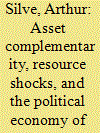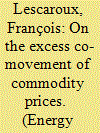| Srl | Item |
| 1 |
ID:
160787


|
|
|
|
|
| Summary/Abstract |
Collaboration between two groups that may invest their resources in a common productive activity has the potential to lead to conflict over the output of that activity. This article examines the stakes of such conflict as well as the willingness for parties to subject themselves to a third-party arbiter. The model highlights three determinants of conflict and of investment in credibility-enhancing institutions: the value of the output, the relative endowments of the parties, and the mutual benefits of collaboration. In particular, the analysis shows that complementarity between the groups’ resources lowers the stakes of political conflict and increases the incentives to commit. The model thus suggests a new mechanism through which we can understand the frequency of conflict and the poor institutions associated in countries with mineral resources. The model’s predictions also help us to understand how Mauritius avoided the resource curse and was able to develop sustainable economic growth.
|
|
|
|
|
|
|
|
|
|
|
|
|
|
|
|
| 2 |
ID:
091550


|
|
|
|
|
| Publication |
2009.
|
| Summary/Abstract |
Since the influential paper by Pindyck and Rotemberg (1990) [The excess co-movement of commodity prices. The Economic Journal 100, 1173-1189], there is a common belief that prices of unrelated commodities tend to move together in excess of what can be explained by fundamentals. In this paper, we consider monthly data of 51 commodities from 1980 to 2008 to confirm that raw resources exhibit co-movement at high frequencies. Nonetheless, focusing on oil and six metal prices, we present evidence that the high level of correlation between cycles of commodity prices can be explained to a large extent by common shocks to inventory levels. Once the influences of supply and demand are filtered out, it appears that the links between commodity prices are rather loose.
|
|
|
|
|
|
|
|
|
|
|
|
|
|
|
|
| 3 |
ID:
112236


|
|
|
|
|
| Publication |
2012.
|
| Summary/Abstract |
Biofuel development continues to be a critical development strategy in Africa because it promises to be an important part of the emerging bio-economy. However, there is a growing concern that the pattern of biofuel development is not always consistent with the principles of sustainable development. This paper assesses the potential of the impacts of biofuel development on food security in Botswana. Drawing on informal and semi-structured interviews, the paper concludes that there is potential for the development of biofuels in Botswana without adverse effects on food security due mainly to availability of idle land which accounted for 72% of agricultural land in the eastern part of the country in 2008. It is suggested that farmers could be incentivized to produce energy crops and more food from such land. Although it is hypothesized that the implementation of biofuel development programmes in other countries had an impact on local commodity prices during the period 2005-2008 in Botswana, it is argued that local biofuel production may not necessarily lead to a substantial increase in commodity food prices because land availability is not a major issue. The paper makes policy recommendations for sustainable biofuel development in Botswana.
|
|
|
|
|
|
|
|
|
|
|
|
|
|
|
|
| 4 |
ID:
160816


|
|
|
|
|
| Summary/Abstract |
This study uses a computable general equilibrium approach to investigate the impact of high global food and agricultural commodity prices and two mitigation options (a rise in agricultural input subsidies and an improvement in agricultural productivity) on poverty and economic performance of Malaysia. Simulated results showed that, as a whole, the high global food price has a negative impact on the economic growth of Malaysia. It decreases real gross domestic product of Malaysia by 0.53%. Although the food price hike initially increases poverty in urban areas, it would significantly decrease the poverty of rural and noncitizen households. However, both mitigation options can reduce the negative impact of the shock on the poverty and economic growth of Malaysia. The agricultural subsidy rise option cannot reduce the poverty level of all household groups, whereas the productivity improvement option can alleviate the poverty level of all household groups. In conclusion, results suggest that the agricultural productivity improvement option is more effective than the agricultural subsidy rise option to mitigate the negative impact of global food price shocks on the economy and poverty of Malaysia.
|
|
|
|
|
|
|
|
|
|
|
|
|
|
|
|